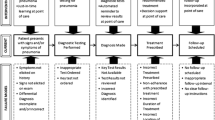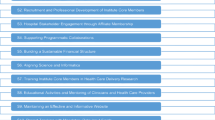Abstract
’Health and disease management’ is a clinical improvement process aimed at ensuring that the best practices known to medical science are incorporated with minimal variation over the entire continuum of care. The University of Pennsylvania Health System (UPHS) is an academic, integrated healthcare delivery system committed to implementing this approach to care by all providers and at all sites. This report outlines our approach to design, implementation, outcomes tracking and improvement, and highlights how the educational, service and research missions of the academic health system add value to the comprehensive health and disease management approach.
The involvement of clinical researchers and academic physicians in the design of programmes contributes directly to improved clinical outcomes. Faculty with specific research interests, and experience with less common conditions, frequently lead this best-practice approach with rarer conditions, so allowing the impact of these programmes on improving the quality of care to be evaluated across many disease states. On the basis of their extensive knowledge of the disease in question, academic faculty play valuable leadership roles in selecting relevant key measures.
Education, a key component of health and disease management implementation, is an area of particular strength in academic systems. Provider education, in particular, can be effectively achieved by academic detailing, led by specialists and utilising the involvement of skilled educators.
A key requirement for programmes such as these is the need to frequently update the best-practice clinical guidelines. The academic health system is ideally poised to rapidly incorporate clinical advance and emerging knowledge into disease management programmes that can reach a wide audience. Health and disease management offers a unique research opportunity for academic physicians who can adapt the use of process control measurement techniques, which have long been the major approach to performance measurement in industry, to the healthcare environment.
Clinical evaluation and outcomes management, has the potential to become widely embraced as a legitimate and important form of research. Substantial effort and resources must be dedicated to gain provider buy-in and achieve compliance. We believe that academic health systems have many of the necessary ingredients to be successful in this initiative. Moreover, if this approach to care is to be widely adopted, and behaviour change achieved, the next generation of healthcare leaders and workers must be introduced to these concepts early in their training.






Similar content being viewed by others
References
Bernard DB, Townsend RR, Sylvestri MF. Health and disease management: what is it and where is it going? Am J Hypertens 1998; 11: 23–7
Bernard DB. Disease management. In: Kost GJ, editor. Point-of-care testing: principles, management, and clinical practice. New York: McGraw-Hill. In press
Joshi MS, Bernard DB. Classic continuous quality improvement integrated with comprehensive disease management as a model for performance improvement. Joint Community J Qual Improve. In press
Ellrodt G, Cook DJ, Lee J, et al. Evidence-based disease management. JAMA 1997 Jun 25; 277(24): 1977–8
Todd WE, Nash D, editors. Disease management: a systems approach to improving patient outcomes. Chicago (IL): American Hospital Publication Inc., 1997
Epstein RS, McGlynn MG. Disease management: what is it? Dis Manage Health Outcomes 1997; 19: 3–10
Eccles M, Clapp Z, Grimshaw J, et al. North of England evidence based guidelines development project: methods of guideline development. BMJ 1996 Mar 23; 312(7033): 760–2
Jones RH, Ritchie JL, Forrester JS, et al. 28th Bethesda Conference. Task force 1: clinical practice guideline development, dissemination and computerization. J Am Coll Cardiol 1997 May 29; (6): 1133–41
Chassin MR, Galvin RH. ‘The urgent need to improve health care quality’. JAMA 1998; 280: 1000–5
Grimshaw JM, Russell IT. Effect of clinical guidelines on medical practice: a systematic review of rigorous evaluations. Lancet 1993; 342: 1317–22
Maschak-Carey BJ, Schutta MH, Schwartz SS, et al. Successful implementation of a comprehensive diabetes disease management program in an integrated academic health system. Dis Manage. In press
Greco PJ, Eisenberg JM. Changing physicians’ practices. N Engl J Med 1993 Oct 21; 329(17): 1263–5
Davis DA, Thomson MA, Oxman AD, et al. Changing physician performance. A systematic review of the effect of continuing medical educational strategies. JAMA 1995; 274: 700–5
Lomas J, Enkin M, Anderson GM, et al. Opinion leaders vs audit and feedback to implement practice guidelines. Delivery after previous cesarean section. JAMA 1991 May 1; 265(17): 2202–7
Soumerai SB, McLaughlin TJ, Gurwitz JH, et al. Effect of local medical opinion leaders on quality of care for acute myocardial infarction: a randomized controlled trial. JAMA 1998 May 6; 279(17): 1358–63
Berwick DM. Harvesting knowledge from improvement. JAMA 1996 March 20; 275(11); 877–8
Berwick DM. Developing and testing changes in delivery of care. Ann Intern Med 1998 Apr 15; 128(8); 651–6
Clemmer TP, Spuhler VJ, Berwick DM, et al. Cooperation: the foundation of improvement. Ann Intern Med 1998 Jun 15; 128(12): 1004–9
Senge PM. The fifth discipline: the art and practice of the learning organization. New York: Doubleday/Currency, 1999
Berwick DM. Aprimer on leading the improvement of systems. BMJ 1996 Mar; 312(7031): 619–22
Acknowledgements
Acknowledgements go to Nanette Talbot and the staff of Health and Disease Management for extraordinary hard work and vision in creating this programme.
Author information
Authors and Affiliations
Corresponding author
Rights and permissions
About this article
Cite this article
Bernard, D.B., Coburn, K.D. & Miani, M.A. Health and Disease Management Within an Academic Health System. Dis-Manage-Health-Outcomes 7, 21–37 (2000). https://doi.org/10.2165/00115677-200007010-00004
Published:
Issue Date:
DOI: https://doi.org/10.2165/00115677-200007010-00004




